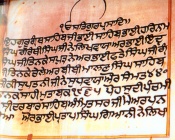Template:AOW83: Difference between revisions
Hari singh (talk | contribs) No edit summary |
Hari singh (talk | contribs) No edit summary |
||
| Line 1: | Line 1: | ||
<h1 style="margin: 0; background-color:#FFE4E1; font-size: 125%; font-weight:bold; border: 1px solid #ffc9c9; margin-top:.0em; margin-bottom:.2em; padding:0.2em 0.2em; text-align: center; color:#FF6600">[[Structure of SGGS|Structure of Guru Granth Sahib]]</h1> | <h1 style="margin: 0; background-color:#FFE4E1; font-size: 125%; font-weight:bold; border: 1px solid #ffc9c9; margin-top:.0em; margin-bottom:.2em; padding:0.2em 0.2em; text-align: center; color:#FF6600">[[Structure of SGGS|Structure of Guru Granth Sahib]]</h1> | ||
[[Image:Guru Granth Sahib By Bhai Pratap Singh Giani.jpg| | [[Image:Guru Granth Sahib By Bhai Pratap Singh Giani.jpg|175px|thumb|right|]] | ||
The [[Guru Granth Sahib]] begins with the word "[[Ek Onkar]]" – ''The All Pervading Being''. From this Word to the tenth Word “Gur-parshad” is called the [[Mool Mantra]]. After this is the rest of the composition called the [[Japji]] composed by [[Guru Nanak Dev]]. This comprises 38 [[Pauri]]s or stanzas, a Prologue and an Epilogue. This is one of the morning prayer of the Sikhs. | The [[Guru Granth Sahib]] begins with the word "[[Ek Onkar]]" – ''The All Pervading Being''. From this Word to the tenth Word “Gur-parshad” is called the [[Mool Mantra]]. After this is the rest of the composition called the [[Japji]] composed by [[Guru Nanak Dev]]. This comprises 38 [[Pauri]]s or stanzas, a Prologue and an Epilogue. This is one of the morning prayer of the Sikhs. | ||
Latest revision as of 13:45, 29 July 2013
Structure of Guru Granth Sahib
The Guru Granth Sahib begins with the word "Ek Onkar" – The All Pervading Being. From this Word to the tenth Word “Gur-parshad” is called the Mool Mantra. After this is the rest of the composition called the Japji composed by Guru Nanak Dev. This comprises 38 Pauris or stanzas, a Prologue and an Epilogue. This is one of the morning prayer of the Sikhs.
The next composition has two parts - (1) "So Dar" and (2) "So Purkh". The Bani, "So Dar" contains 5 Shabads and "So Purkh" contains 4 Shabads. This form most of the evening prayer of the Sikhs and is called the Rehras. After this is the Bani called Sohila (full name, Kirtan Sohila), which contains 5 Shabads and is the bed-time prayer.
Within it's 1430 pages, most of the Shabads (hymns) of the Sri Guru Granth Sahib are arranged in thirty-one Ragas, the traditional Indian musical measures and scales. ....Continued.

